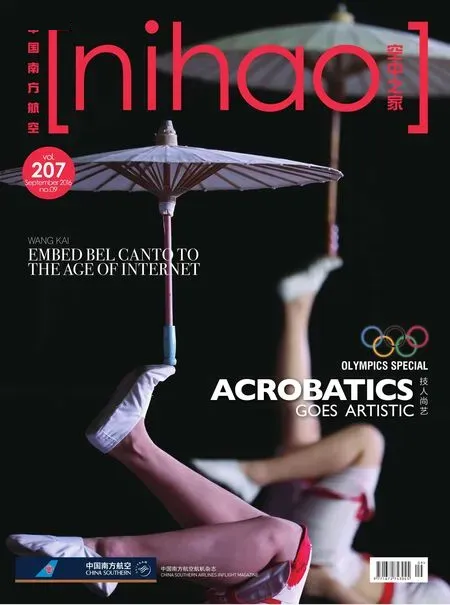THE LUMINOUS PEARL
THE LUMINOUS PEARL
Text by Guo Dan Translation by Shi Yu Illustrations by Haolun Zhang

Ancient tales about gods can be more creative than we expect. Though meaningless, some tales can be imaginatively wild. One of the most wellknown tales is Hangao Jiepei (Two Goddesses Giving Away a Pendant), from the Tales of Gods-Two Goddesses by the River, by Liu Xiang from Han Dynasty (206 BC-220 AD), “Two ladies, whose names were unknown to others, were wandering by the Hanjiang River when they encountered Zheng Jiaofu. Zheng Jiaofu was amazed by these two ladies, who appeared out of nowhere. He said to his servant, “I would like to ask their permission tohave their pendants…” Finally, he did get to keep their pendants.
The tale had an impact on many writers following Liu Xiang. Li Han, a poet from Five Dynasties (907-979), mentioned this pendant-giving tale in Meng Qiu, a textbook for children). Yan Shu, a poet from Song Dynasty (960-1279), wrote in his famous poem Magnolia that the action to give away a pendant is an action that loving ones in fairy tales would do. There are also a number of poems that eulogize this story.
Now I have also a jade pendant, however, I know not to whom I shall give it.
Do you know there is a tune for Ci (one of traditional poem styles) called To Whom Shall I Give My Pendant? The name of this tune came from the tale in which two goddesses give Zheng Jiaofu their pendants. Pendant? The name of this tune came from the tale in which two goddesses give Zheng Jiaofu their
This tune consists of 66 words arranged in two tune styles and rhythms. To Whom Shall I Give My Pendant originally came from one of the pieces by Yan Jidao. Yan Jidao was the youngest son of Yan Zhu. He was my favorite Ci poet; I even wanted to marry him when I was a child. Ironically, the best Ci poet is inferior to those guys selling counterfeit things online.
In case you were wondering, the two Goddesses were in Hubei province, thus the one by the side of West Lake in Hangzhou is not a goddess, she is Bai Niangzi – the lady of white.

Kallen Guo
senior filmmaker, socialite and bestselling author, authored Don't Fall in Love with Zurich, the winner of The Best Foreign Language Novel.
郭丹
資深影視人、名媛、暢銷書作家。代表作包括最佳外語小說獎獲得作品《別愛蘇黎世》等。
解佩令
古代的神仙故事,不像現在這么宣化教義。它經常天馬行空而毫無意義。其中的佼佼者便是《漢皋解佩》。漢朝劉向《列仙傳·江妃二女》:“江妃二女者,不知何所人也,出游于江漢之湄,逢鄭交甫,見而悅之,不知其神人也,謂其仆曰:‘我欲下請其佩。’……遂手解佩與交甫。”
五代李瀚 《蒙求》詩:“淵客泣珠, 交甫解佩。”宋朝晏殊 《木蘭花》詞:“聞琴解佩神仙侶,挽斷羅衣留不住。”元代李裕 《次宋編修顯夫南陌詩四十韻》:“楚女窺墻日,文園病渴年。合歡連組帶,解佩雜芳荃。”清鈕琇《觚剩·河東君》:“蓋就新去故,喜極而悲,驗裙之恨方殷,解佩之情逾切矣。”
我如今亦有玉佩,卻不知解與何人。
你們知道有個詞牌令叫作《解佩令》不?始見于晏幾道《小山樂府》。調名取義于鄭交甫遇漢皋神女解佩事。雙調,六十六字,上下片各五仄韻。第一、二句亦有不用韻者。晏幾道是晏殊的小兒子,亦是我最喜最憐的詞人,幼時我想嫁給他。而在當今社會人的眼里,做詞牌令的男子甚至不及做假貨電商的男人厲害。
漢皋在湖北,站在西湖邊就不是神女,是白娘子啦~

